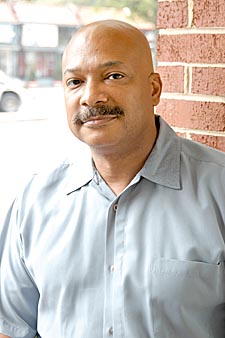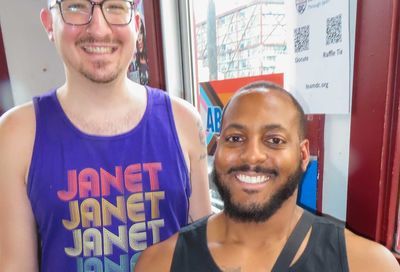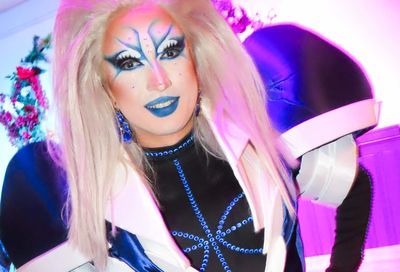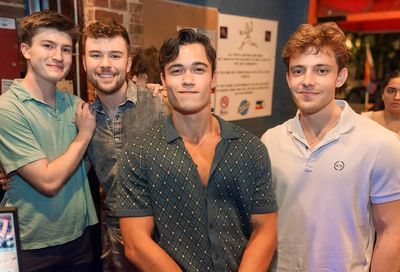The Buddy System
After nearly three decades at the forefront of D.C.'s black gay community, Buddy Sutson is having a summer full of pride
At 57, Otis T. “Buddy” Sutson has a lot of activist work behind him. But just talk to him for a few minutes and you’ll soon have the feeling that he’s got a lot more in front of him as well, even if he says it’s time to move over and let the next generation take its time at the wheel.
Sutson has a string of accomplishments attached to his name, but one of the most well-known is his involvement in the Best of Washington, a social club for black gays and lesbians that opened up a world of nightlife and legendary parties for a nascent community in the early days of gay liberation. As times and the community changed, Sutson helped oversee the growth and change of the organization from purely social to one of support, activism and philanthropy.
At this weekend’s Black Pride 2004, Sutson — along with fellow activist and organizer Carlene Cheatam — will receive the Welmore Cook Award in recognition of his long-time community service. He was also named as one of the Capital Pride’s 2004 Pride Heroes.
After a quarter-century of service for the Federal Reserve Bank, Sutson decided to take an early retirement. Now he’s embarked on what he calls his second career, running the foodbank for Damien Ministries, which provides HIV/AIDS services for more than 1,000 HIV-positive people in D.C. And he’s among those whose work on past Black Pride weekends have helped the event grow to such renown.
Self-described as shy and somewhat introverted, Sutson is nonetheless quick to smile and laugh as he talks about his years in the forefront of the black gay community. It’s a laugh and a smile that’s catching.
 |
METRO WEEKLY: Where does the nickname Buddy come from?
OTIS “BUDDY” SUTSON: As kids, my brother and I were eleven months apart. He could not say “This is my brother,” but he could say “This is my buddy.” So Buddy stuck.
MW: You’re a native Washingtonian. How was it growing up in D.C.?
SUTSON: It was beautiful. I grew up in Southeast D.C. It was very rural at the time — we had chickens and gardens and open spaces, it was a wonderful place for kids to grow up. It was Marshall Heights, in Ward 7 off of East Capitol and Benning Road.
MW: No more gardens and chickens there these days.
SUTSON: [Laughs.] No more gardens and chickens. All the spaces are taken up now.
MW: It must be interesting to have seen all the changes in the city over the years.
SUTSON: It has really changed. They had great schools then — I think my high school education is better than some of these college degrees that they’re giving out now. Then, the black community was really interested in education as a whole. And I was here for the riots, and I saw the city change dramatically.
I think there are a lot of social changes going on now. Crack destroys the fabric of everything in the black community, and it really set us back tremendously. We’re just beginning to rebound from that. The current generation is not involved in crack as much — they’ve seen their siblings go through it so they’re not following that same route. [But before] the streets were terrible and you couldn’t get any services. It was a rough time for the city, a really rough time.
MW: Where do you live now?
SUTSON: In Columbia Heights, and tremendous changes as you know are taking place there. I’ve been waiting for it for twenty years, but now things are just booming. Politics in this city are on the rise, and I’m just impressed with what [Mayor] Anthony Williams has been able to do. Not everybody loves him, but I think he has a tough job.
MW: He comes across as a hard guy to love.
SUTSON: [Laughs.] I don’t think he’s interested in love. As long as he gets some of the stuff done, and he’s done a great job in that sense. They trimmed the trees on my street for the first time since I’ve been there. It’s a little thing, but to me that was like, “Wow, they actually did that.” And the neighborhood committees are getting together and making all kinds of improvements.
MW: You served in the Army in Vietnam. Were you drafted?
SUTSON: I was actually attending Howard University, before we had all these loans available to people, and my financial situation had got worse. Back in those days, once you dropped out of school you were immediately drafted. Going into the service was one of the scariest points of my life. I had gay tendencies at that time, so I could easily have opted out of it, but I didn’t. I went into the service with the hope and the idea that it would turn my life around. Needless to say, I just ran into so many beautiful friends in the military. [Laughs.]
MW: When you say “turn my life around,” you mean you hoped the military would eliminate those tendencies?
SUTSON: Little did I know that they were just a part of me. But at that time there was the idea that you go into the military and they turn you into a man. But I did learn a lot in the military.
I went into food service to keep my ass off the front line. [Laughs.] I eventually got to Vietnam after basic training and I was scared to death. My heart goes out to those guys over there [in Iraq] now. You don’t see it coming across on the TV, but when you’re eighteen or nineteen-year-old guys, you’re scared to death. But I grew up a lot [in the service].
MW: Describe the experience of going into a foreign country during wartime.
SUTSON: It was scary. We got off the plane and onto a bus that had bars and wires on it so they couldn’t throw grenades into it. You were just hauled around like cattle, actually. But God’s been with me every step of the way. I went to a place called Cam Ranh Bay, which was surrounded by mountains and water. It was a depot for bringing supplies into the country was very well protected. I only saw battle [when I was] leaving, and that was very minimal.
MW: You wanted the Army to get rid of your gay tendencies — when did you realize that wasn’t going to happen?
SUTSON: The attraction never stopped, and I was running into other men in the same situation. It didn’t solve that tendency problem at all, I just had this love for men and there were tons of them, [although] I didn’t participate a lot sexually there.
MW: When did you first become aware of those tendencies? At Howard, or high school, or earlier?
SUTSON: Actually, when I was in high school I started to experiment sexually with guys and women, and found that I liked buys better.
MW: You would have been in high school during the early sixties. How was it exploring your sexuality in that way at that time?
SUTSON: Things were a lot different, very much undercover. But it had a mystique to it because it was all about the discovery. There were male clubs and things like that where the schools and such were grooming you to be gentlemen, and you would encounter people there. It was hard because you didn’t want to be discovered. It was very difficult at that point.
MW: When did you start accepting yourself as gay?
SUTSON: After I came back from Vietnam I sort of accepted who I was. I had gotten engaged before I left to go to Vietnam, and she married one of my friends while I was away. I realized then that it wasn’t for me — she did me a favor. [Laughs.] If I’d gotten married it would’ve been a mess.
MW: How hard was it to come out to your family?
SUTSON: I never officially came out to my family. I was staying with my father when I got back from Vietnam, and he just sort of figured it out from the number of phone calls I was getting from guys. It was most difficult because my father thought that [he could change me] by shaming me, and telling all of my friends, from church members to friends I went to high school with. They would call to try to persuade me [to change]. They thought it was a phase that I was going through. I went through a rough time — depression and the whole nine yards.
I withdrew from my family for a number of years. My father and I weren’t seeing eye to eye because my boyfriends would come over and he just wasn’t comfortable with it. And I needed my own space. So I moved out and separated myself from my family for a few years. My father was a good man. He even came around after he dealt with my homosexuality and realized it wasn’t the worst thing in the world. One day he told me that he loves all his kids, no matter what.
MW: How was your mother with everything?
SUTSON: My mother took a back seat, I had a very strong father figure. You’re talking about back in the fifties — my mother had a back seat to everything. She would give me the nurturing that I needed, but my father made all the decisions in the family, and shortly after I came back from Vietnam, she got seriously ill and never recovered.
MW: How has that traditional upbringing influenced who you are today?
SUTSON: Well, I’m a little bit like him. So I try to be understanding of other people, of someone else’s wishes. I learned a lot from that experience with my folks, and I try not to be as domineering, to be more open to suggestions.
MW: You were a guiding presence behind the Best of Washington. How did that come about for you?
SUTSON: A friend, Bob Lomax, asked me to join the organization. We started these functions to provide an entertainment outlet for us. It was very small at first. Once again, everything was undercover — most of us were leading double lives. But it grew over the years as we had one success after another. It really snowballed.
MW: You said things were undercover. Was there a black gay community during the seventies as we would think of one today?
SUTSON: There wasn’t a black gay community. We knew each other, but we were not collective in any way. I don’t know how seriously we actually took our lives at that point — we didn’t see it as a movement, we were just having fun. We had a lot of internal homophobia going on at that time. We weren’t ready to come out, we wanted to stay where we were. We created another club called the Little Rascals to be our heterosexual component. So we would invite our straight friends to that gathering — we were just masquerading.
Again, we were living double lives. We all worked for the federal government or the district government and it was strictly taboo back then. They’d throw you in jail or you’d lose your government job. It was scary.
MW: What’s Best of Washington doing today?
SUTSON: We’re still together and still having functions. We’ve incorporated some new members, younger members, and that’s still our goal. My personal goal is for it to continue. We have an endowment that keeps us going financially, so we want to pass it on. It doesn’t have to be in the same form, because times change. We just want to keep it going.
MW: Are there enough young people coming into the black gay community who are focused on political activism, or is that something that needs to be focused on?
SUTSON: We need to focus on that, and there is a big disconnect between the younger and the older [generations], but they’re there. They’re watching. I think my age group has to exit the scene before they really appear, but they’re there and they’re being groomed. At one point I thought that there was not a lot of concern there, but I think they will step up to the plate.
MW: We have a number of gay communities in D.C. — the black gay community, the white gay community, the Latin and Asian gay communities. What is the most positive thing you see about the black gay community, as its own distinct group?
SUTSON: I think our culture is different, and I think we have to embrace that. I used to worry about us not mingling, all the groups getting together, but I don’t think that’s really as important as I once thought. I think it’s all right to be in a city that’s divided culturally. Some of these issues you can’t get around, but so as long as we can move forward [as a community], as long as we have institutions that we’re building, as long as we’re represented, I’m fine with that. And we’re making progress.
MW: What led you to change your mind about the importance of the groups coming together?
SUTSON: I used to be a big proponent of integration in a sense. But integration is a double-edged sword. When you integrate, you lose some of the good things that you have: your own little communities, your institutions, what really makes you click. There has to be a balance, but I don’t think integration has to be the total goal. I don’t think it will happen in America — it hasn’t happened in the world, so I don’t think it’s going to happen here.
MW: What’s the biggest challenge or obstacle facing the growth of the black gay community in D.C.?
SUTSON: We’ve got to get some black gay representation on the city council. We have to continue to build our financial structure. We don’t have a lot of black, openly gay ownership of businesses. There are a lot of people who own businesses, but they operate them as “gay friendly.” I’d like to see us have our own institutions and businesses that are knowingly gay.
MW: You’ve been involved as an organizer of Black Pride weekend in the past. How do you feel about the growth of the event over the past few years?
SUTSON: It’s really grown. The internet and all the techie stuff just pushed it along — before we were going by word of mouth and mailings. But the crew that’s there now have really pushed it along. They’ve had to make some tough decisions, some the community didn’t totally agree with. Moving into the convention center has sort of taken away the parade — we had an unofficial parade at Banneker Field where everybody would strut their stuff, so to speak — so we’re now enclosed on the inside and it makes good sense [because of weather issues]. And they’re doing a lot of good things in assisting other prides across the country.
I enjoy the camaraderie of Black Pride. You have to be outgoing and you have to extend yourself, but you meet so many new and interesting people from all across the country. It’s amazing to me what we’re doing. It warms your heart. I enjoy a good party, but I also attend some of the workshops and get in touch with the issues out there.
MW: What did you think when you were told you would be receiving the Welmore Cook award?
SUTSON: This is like my Oscar, my Globe, my Tony. This is the biggie to me. I was just thrilled. Because I’m not an in your face kind of guy. I’m basically quite shy, and introverted up to a point. You have to push me out on stage — but once the lights are on, I’m okay. To be recognized meant a lot to me, it really meant a lot. I’m not a general, I’m more of a lieutenant type of guy. There are enough of us who want to be generals and I have no aspirations for that. I can’t make those tough decisions without some pain. I’m better at being in supporting roles.
MW: You’ve also been named one of the 2004 Capital Pride Heroes. It’s a big pride year for you.
SUTSON: I am just thrilled. Am I going to hit lotto next? [Laughs.] But it makes you think, “Well, somebody did notice.” It’s an eye-opener for me.
MW: Did you go through periods where you thought nobody really cared?
SUTSON: You get that “Why give a damn?” The naysayers are constantly telling you, “You’re wasting your time, you’re spending your money, you should be on the beach somewhere.” I had all that. But Carlene [Cheatam] once told me, “Don’t give up on our people.” I gave a fundraiser once and nobody showed up. Nobody showed up. I was so crushed. But now if I give a fundraiser people call and ask if can they attend. So it’s a development stage. As a people we’re becoming more philanthropic. We have the money now, we’re beginning to have disposable income. It’s just a wonderful time.
To read more about Buddy Sutson and the Best of Washington, visit www.metroweekly.com. Also on the site is an interview from earlier this year with Welmore Cook Award-winner Carlene Cheatam. D.C. Black Pride Weekend kicks off on Friday, May 28, and concludes Sunday, May 30 with the Black Pride Festival 2004 at the Washington Convention Center, 801 Mt. Vernon Place, from noon to 7 p.m. For more information and a complete listing of the weekend’s events and parties visit www.dcblackpride.org.
Support Metro Weekly’s Journalism
These are challenging times for news organizations. And yet it’s crucial we stay active and provide vital resources and information to both our local readers and the world. So won’t you please take a moment and consider supporting Metro Weekly with a membership? For as little as $5 a month, you can help ensure Metro Weekly magazine and MetroWeekly.com remain free, viable resources as we provide the best, most diverse, culturally-resonant LGBTQ coverage in both the D.C. region and around the world. Memberships come with exclusive perks and discounts, your own personal digital delivery of each week’s magazine (and an archive), access to our Member's Lounge when it launches this fall, and exclusive members-only items like Metro Weekly Membership Mugs and Tote Bags! Check out all our membership levels here and please join us today!




















